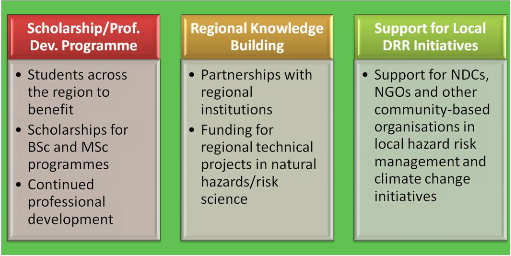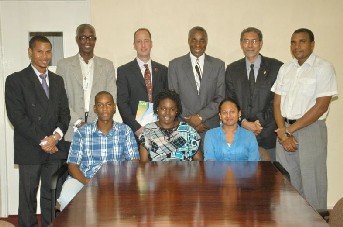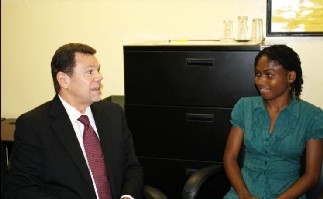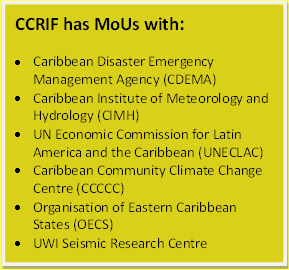In 2009, the Caribbean Catastrophe Risk Insurance Facility (CCRIF) launched its Technical Assistance Programme. This Programme consists of three components and is designed to provide an ongoing mechanism for grant support within the Caribbean region for capacity building initiatives and the development and implementation of projects which have a strong potential for improving the effectiveness of risk management. The Programme aims to help Caribbean countries deepen their understanding of natural hazards and catastrophe risk, and the potential impacts of climate change on the region. The three components are as follows:

CCRIF Technical Assistance Programme
As part of the Scholarship/Professional Development component, CCRIF has awarded fourteen scholarships between 2010 and today either through its Extra-Regional Scholarship Programme, its University of the West Indies (UWI)-CCRIF scholarship programme or as part of its cooperation with member countries and regional organisations. Total disbursements to date are in excess of US$200,000.
CCRIF launched its scholarship programme with UWI in 2010 and since then the Facility has provided a total of nine scholarships to students at the Mona (Jamaica) and St Augustine (Trinidad & Tobago) campuses of the University. CCRIF provides three scholarships each year for the one-year disaster management Masters degree offered at the Mona Campus and two two-year scholarships for students entering their second of three years in the Geography/Geology degree programme (Mona Campus) or Civil with Environmental Engineering degree programme (St Augustine Campus). The total value of awards disbursed in this category to date is US$89,250. Another five students will receive scholarships in the 2012/13 academic year – two at the undergraduate level and three at the Masters level.

The first batch of UWI-CCRIF scholarship recipients. Back Row, l-r – Mr Rhon-Paul Soltau, scholarship recipient; Mr William Iton, University Registrar; Dr Simon Young, CEO Caribbean Risk Managers, Facility Supervisor CCRIF; Prof Alwyn Wint, Pro Vice-Chancellor, Undergraduate Studies; Prof Ronald Young, Pro Vice-Chancellor, Graduate Studies; and Mr Dorlan Burrell, scholarship recipient. Front Row, l-r – scholarship recipients, Mr Kevin Douglas, Ms Odene Baker, and Ms Gerarda Ramcharansingh
In February 2012, CCRIF launched its Extra-Regional Scholarship Programme. Annlyn McPhie and Mahendra Saywack were the scholarship recipients for 2012 under this programme. Ms McPhie will pursue a Masters in Public Administration degree in Environmental Science and Policy at Columbia University, USA and Mr Saywack will complete a Master of Science degree in Climate Change and Development at the University of Sussex, UK. The value of these two scholarships totals in excess of US$99,000.
The extra-regional scholarships will be offered annually to CARICOM nationals who are desirous of pursuing a Masters or MBA degree in areas related to catastrophe risk management at a university in the United Kingdom, United States or Canada. Eligible programmes include Masters-level courses in the following areas:
- Catastrophe Risk Management
- Property/Casualty Insurance
- Disaster Management
- Meteorology/Climate Change
- Engineering (Civil/Environmental/Building with disaster focus)
Prior to the official launch of the extra-regional scholarship programme, CCRIF, in 2011, provided a grant of £10,000 to Wazita Scott, an employee of the Caribbean Institute for Meteorology and Hydrology to attend Reading University in the UK to pursue a Master of Science degree in Atmosphere, Ocean and Climate. The scholarship was provided as part of the terms of a Memorandum of Understanding between the Caribbean Institute for Meteorology and Hydrology (CIMH) and CCRIF.

Photo shows Ms Wazita Scott conversing with Dr Warren Smith, then Board Member of CCRIF, at his office at the Caribbean Development Bank in August 2010. At that meeting, Dr Smith presented Ms Scott with her scholarship.
Support also is provided to regional and member government institutions from time to time to build capacity of key individuals to fulfil their mandates related to catastrophe and disaster risk management. Notable examples of this assistance are awards provided by CCRIF in 2011 to two individuals employed to Belize’s National Meteorological Service to allow them to study for a Bachelor of Science degree in Meteorology at the University of West Indies, Cave Hill Campus, Barbados.
Over the years CCRIF also has provided support to individuals and organisations to engage in professional development opportunities. Some of this support has included: a grant of US$5,000 provided to Winston Gall, meteorological technician with the Cayman Islands Airport Authority, to further his studies in Meteorology at the Graduate School of the US Department of Agriculture; and support to Andrea Sealy of the CIMH to participate in the International Training Course on Satellite Meteorology held in Beijing, China in June 2010.
Additionally, over the period 2011 to 2012, CCRIF developed and delivered an online training course in understanding and using its Real-Time Forecasting System (RTFS). To date, one hundred and nineteen persons from member countries and various international development organisations have been trained. The RTFS is a storm impact forecast tool which provides users with real-time hurricane hazard and impact information. The RTFS is made available on June 1 each year at the beginning of the Atlantic Hurricane Season or when a storm becomes active within the designated CCRIF monitoring region. The main users of the RTFS product include disaster and emergency managers and meteorological officers.
CCRIF believes that building capacity in catastrophe risk management at the individual level through support for education will ultimately contribute to the main objective of its overall technical assistance programme helping countries in the region deepen their understanding of natural hazards and catastrophe risk and the potential impacts of climate change.
In addition to providing scholarships, training and professional development opportunities, CCRIF continues to develop a range of informational products such as booklets and technical papers, around subject areas relating to disaster risk, risk-transfer solutions and climate change, which can promote informed decision making with respect to catastrophe risk as the Facility commits to increasing the focus of Caribbean governments on disaster risk reduction as part of national planning efforts.

Also, through the Regional Knowledge Building component of its technical assistance programme, CCRIF continues to support its members in the development and implementation of strategies for disaster risk management and adaptationto climate change. Much of this is being done through the establishment of strategic alliances with key regional organisations. To date, CCRIF has developed six strategic alliances with regional institutions, through MoUs and other mechanisms, which are aimed at developing programmes and other initiatives to reduce existing vulnerabilities in the small island and coastal states of the region.
CCRIF’s capacity building initiatives are all designed to enable the Facility to achieve its mission of: assisting Caribbean governments and their communities in understanding and reducing the socio-economic and environmental impacts of natural catastrophes, whilst at the same time contributing to the long-term sustainable development of the Region.


